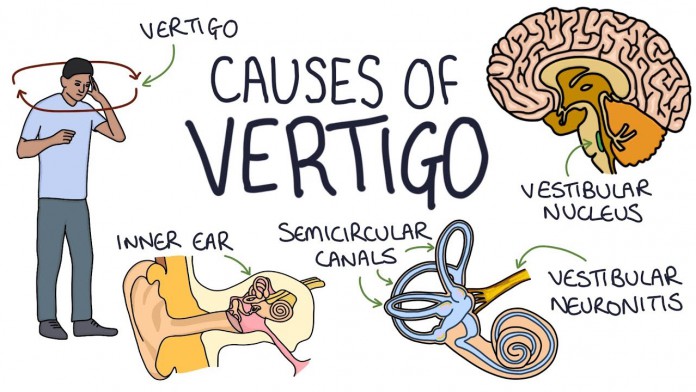Often dizzy? It could be vertigo | Authored article by Dr. Rohit Udaya, ENT & Cochlear Implant Surgeon, Aster RV Hospital
A sudden sensation of feeling off-balance or an internal or external spinning, usually incited by moving the head too swiftly or a change in the position of your head is referred to as vertigo. If you experience this quite frequently then it is suggested to seek help. Vertigo is often misunderstood as a sign dizzy of fatigue, giddiness or imbalance.
There are two major types of vertigo –
- Peripheral vertigo: It is a type when there is a problem in your inner ear which maintains balance of a body.
- Central vertigo: This condition is experienced when there is a dysfunction in one’s central nervous system, where the person sees movement in the dizzy surroundings, spinning and other such uncomfortable scenarios.
What causes vertigo?
Vertigo usually occurs due to certain issues with the inner ear. The inner ear is responsible for sending signals to the brain about head and body movements relative to gravity as well as for dizzy maintaining the balance. Some of the common causes of inner ear problems include:
- Inflammation within the inner ear because of a viral or bacterial inner ear infection.
- Due to BPPV (benign paroxysmal positional vertigo) in which tiny calcium particles cluster up in canals of the inner ear.
- Meniere’s disease, which is also an inner ear disorder, is thought to be caused by a buildup of fluid and changing pressure in the inner ear.
- Vestibular neuritis or labyrinthitis, the infection that leads to inflammation in the inner ear around nerves that are important for helping the body sense balance
- Certain medications that cause ear damage
Important Announcement – EasyShiksha has now started Online Internship Program “Ab India Sikhega Ghar Se” during this lockdown.
Apart from the inner ear, some other causes that can lead to vertigo are:
– Complications from diabetes
– Migraine headaches
– Reduced blood flow to the base of the brain
– Head trauma and neck injury
– A problem in the brain like a stroke or tumor
– Multiple sclerosis
Symptoms of vertigo:
Symptoms in vertigo can last a few minutes or few hours. Some of the symptoms that a person is likely to experience if he/she is suffering from vertigo include:
- A feeling of spinning, tilting, swaying, unbalanced or being pulled in one direction
- Loss of hearing and a ringing sensation in the ears
- Visual disturbances
- Weakness
- Difficulty in speaking
- A decreased level of consciousness
- Struggle in walking
- Nausea
- Abnormal or jerking eye movements
Vertigo is diagnosed generally through medical history and a physical exam. CT scans, blood tests, magnetic resonance imaging (MRI) and electrocardiogram (ECG) is also likely to be performed. Treatment for vertigo also depends on its diagnosed cause. If the symptoms are observed, one should consult a doctor and never adopt self-medication or home therapy.

Important Announcement – EasyShiksha has now started Online Internship Program “Ab India Sikhega Ghar Se”

Certain risk factors that have been noted to enhance the risk of vertigo-associated disease (VAD) include:
- Cardiovascular diseases specifically in elderly people
- Recent ear infection, especially if the inner ear is affected
- Head trauma history
- Certain medications like antidepressants and antipsychotics
Since the cause can differ, detailed examination is required to decipher vertigo and its reason, therefore one must not self-medicate or opt for home remedies when it comes to vertigo. Even counter medication is not advised as after identifying symptoms, a proper diagnosis is a must by a professional doctor who will accordingly proceed with the treatment.
People generally tend to ignore vertigo and not take it seriously. This is so because vertigo has several misconceptions and myths around it. Some of the misconceptions about vertigo which are not true include:
Ø Vertigo is a fear of heights
Ø Vertigo is a problem with the brain
Ø Vertigo subsides on its own
Ø Vertigo means lightheadedness
Because of these existing misconceptions, people generally either do not seek timely medical help or tend to self-medicate vertigo. However, it is essential to let the doctor examine your condition and understand the type or cause of vertigo better and treat it properly.
Top Courses in Software Engineering
For more information related to technology, visit: HawksCode and EasyShiksha
Empower your team. Lead the industry
Get a subscription to a library of online courses and digital learning tools for your organization with EasyShiksha
Request NowQ. Are EasyShiksha's internships truly free?
Yes, all internships offered by EasyShiksha are completely free of charge.
Q. How can I apply for an internship with EasyShiksha?
You can apply by visiting our website, browsing available internships, and following the application instructions provided.
Q. What types of internships are available through EasyShiksha?
EasyShiksha offers a wide range of internships across technology, business, marketing, healthcare, and more. Opportunities are continuously updated.
Q. Will I receive a certificate upon completing an internship?
Yes, upon successful completion, you will receive a certificate recognizing your participation and achievements.
Q. Are EasyShiksha's internship certificates recognized by universities and employers?
Yes, the certificates are recognized by universities, colleges, and employers worldwide.
Q. Is the download of certificates free or paid?
Access to internships and courses is free, but there is a small fee to download certificates, covering administrative costs.
Q. When can I start the course?
You can choose any course and start immediately without delay.
Q. What are the course and session timings?
These are fully online courses. You can learn at any time and pace. We recommend following a routine, but it depends on your schedule.
Q. What will happen when my course is over?
After completion, you will have lifetime access to the course for future reference.
Q. Can I download the notes and study material?
Yes, you can access and download course materials and have lifetime access for future reference.
Q. What software/tools would be needed for the course?
All necessary software/tools will be shared during the training as needed.
Q. I’m unable to make a payment. What should I do?
Try using a different card or account. If the problem persists, email us at info@easyshiksha.com.
Q. Do I get the certificate in hard copy?
No, only a soft copy is provided, which can be downloaded and printed if required.
Q. The payment got deducted but shows “failed”. What to do?
Technical errors may cause this. The deducted amount will be returned to your account in 7-10 working days.
Q. Payment was successful but dashboard shows ‘Buy Now’?
Sometimes payment reflection is delayed. If it takes longer than 30 minutes, email info@easyshiksha.com with the payment screenshot.
Q. What is the refund policy?
If you face technical issues, you can request a refund. No refunds are issued once the certificate has been generated.
Q. Can I enroll in a single course?
Yes, select the course of interest, fill in the details, make payment, and start learning. You will also earn a certificate.
Q. My questions are not listed above. I need further help.
Contact us at info@easyshiksha.com for further assistance.
ALSO READ: a-little-step-towards-success
Get Course: Digital-Marketing-Fundamentals-SEO




































































